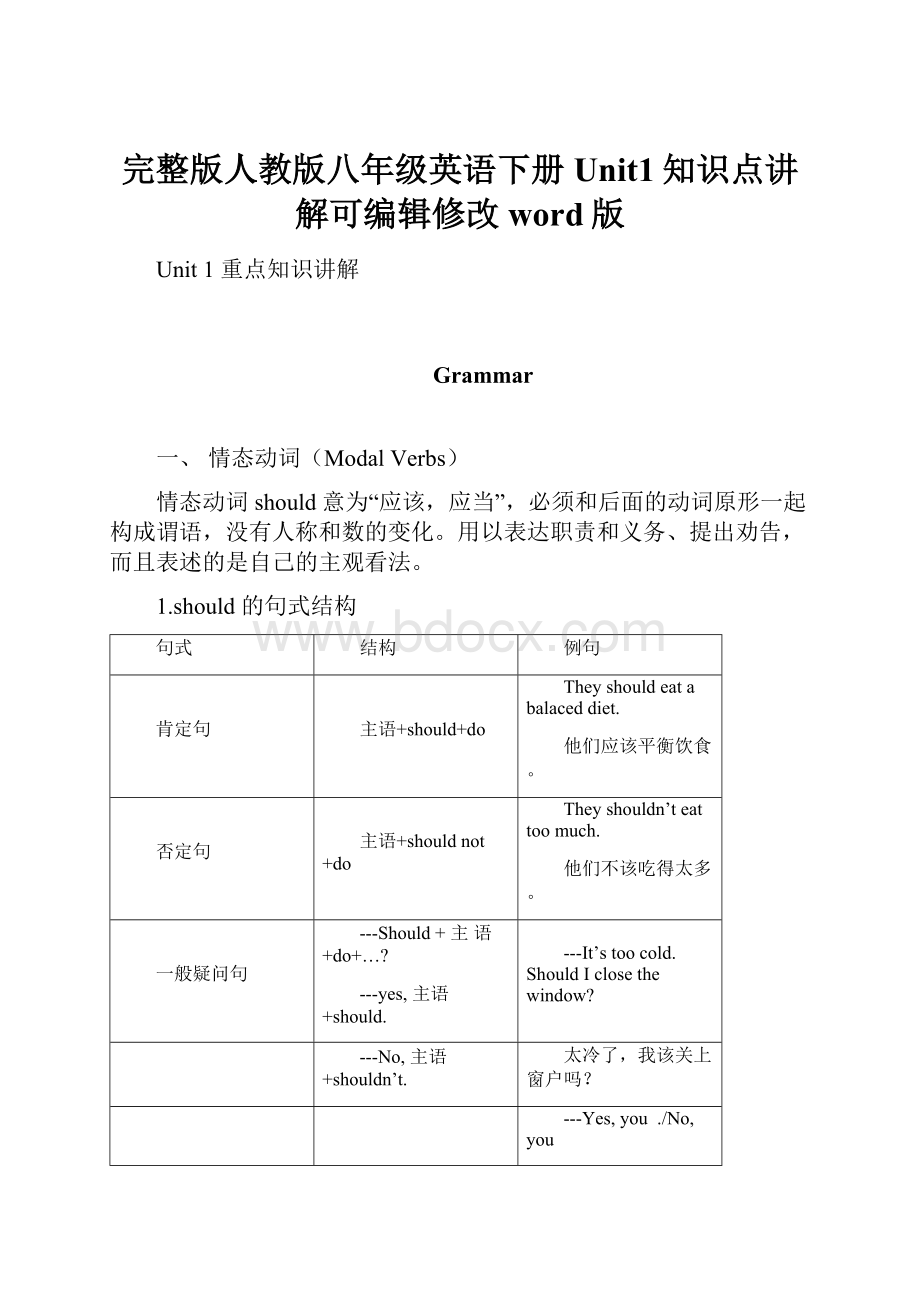完整版人教版八年级英语下册Unit1知识点讲解可编辑修改word版.docx
《完整版人教版八年级英语下册Unit1知识点讲解可编辑修改word版.docx》由会员分享,可在线阅读,更多相关《完整版人教版八年级英语下册Unit1知识点讲解可编辑修改word版.docx(15页珍藏版)》请在冰豆网上搜索。

完整版人教版八年级英语下册Unit1知识点讲解可编辑修改word版
Unit1重点知识讲解
Grammar
一、情态动词(ModalVerbs)
情态动词should意为“应该,应当”,必须和后面的动词原形一起构成谓语,没有人称和数的变化。
用以表达职责和义务、提出劝告,而且表述的是自己的主观看法。
1.should的句式结构
句式
结构
例句
肯定句
主语+should+do
Theyshouldeatabalaceddiet.
他们应该平衡饮食。
否定句
主语+shouldnot+do
Theyshouldn’teattoomuch.
他们不该吃得太多。
一般疑问句
---Should+主语+do+…?
---yes,主语+should.
---It’stoocold.ShouldIclosethewindow?
---No,主语+shouldn’t.
太冷了,我该关上窗户吗?
---Yes,you./No,you
.
是的,你应该。
/不,你不应该。
2.should的用法
用法
例句
表示劝告、建议
YouanswerthequestioninEnglish.
你应该用英语回答这个问题。
表示推测
Theybeathomenow,Ithink.
我认为,他们现在应该在家。
表示惊讶、赞叹、不满等
HowIknowit?
我怎么知道这间事情呢?
注意:
should在以why,who,how等疑问词开头的问句中,意为“竟然,居然,怎么会”,表示意外、惊喜或在说话人看来是不可思议的。
二、其他表示建议的句型
用法
例句
Shallwe/I+do+…?
Shallweforawalk?
咱们去散步好吗?
What/Howabout+doing/sth…?
Whataboutswimming?
去游泳怎么样?
Let’s+do…?
Let’sandthem.咱们去看看他们吧。
You’d/We’dbetter(not)+do…?
Wewaitalittlelonger.
我们最好再稍等一会儿。
Whydon’tyou+do…?
Whydon’tyouawalkoutside?
为什么不出去散步呢?
Whynot+do…?
Whyawalkoutside?
为什么不出去散步呢?
三、反身代词
表示反射或强调的代词叫做反身代词。
反身代词是由第一人称、第二人称形容词性物主代词或第三人称代词的宾格形式,词尾加self或selves组成。
反身代词可译“本人”、“本身”,为加强语气,也常翻译为
“亲自”、“自己”。
不定人称代词oneoneself.
1、反身代词的分类
数人称
第一人称
第二人称
第三人称
单数
myself
yourself
Himself,herself,itself
复数
ourselves
yourselves
themselves
2、反身代词的用法
用法
说明
例句
作动词的宾语
常用于enjoy,teach,hurt,buy,
introduce,dress,help,
lookafter,getdressed作宾语
HeisteachingEnglish.
他在自学英语。
Weenjoyedlastnight.
昨天晚上我们玩得很开心。
做介词的宾语
常用于in,on,with,of,after,by作宾语
Shelivesbyinthecountryside.
她一个人生活在乡下。
做同位语
强调作用、加强语气
Didyoumakethecake
?
这蛋糕是你亲自做的嘛?
Mr.Blackisalawyer.
布莱克先生本人就是一名律师。
做表语
强调“自己”
Justbe.做你自己就好了。
Maryhasn’tquitebeenrecently.玛丽最近有些不对劲。
单词的用法
SectionA
1.What’sthematter?
怎么了?
该句常用询问某人患了何种疾病或遇到了什么麻烦,其后用with引出对象。
1).What’sthematterwithsb.?
=what’swrongwithsb.?
=what’sthetrouble/problemwithsb.?
=what’sone’strouble/problem?
e.g.What’sthematterwithTom?
=what’swithTom?
=What’sthewithTom?
=What’sTom’s?
2).matter,名词,“问题,事情”
e.g.Wehaveimportant(matter)todiscuss.
我们有些重要的问题要讨论。
3).动词,“要紧,关系重大”
e.g.Itdosen’tthatyoucamelate.
2.Ihaveacold.我感冒了。
1).have/get/catchacold“感冒,着凉”
Theoldmanacoldyesterday.那位老人昨天感冒了。
2).“have+a/an+疾病名称”意为“得了….病”
haveafever,haveacough,haveaheadache…
3.Ihaveasoreback.我背痛。
“Ihaveasore+身体部位”意为“…痛”辨析sore和ache
sore
形容词,意为“疼痛的;酸痛的”用于身体部位名词前
sorefeet
sorelegsorethroat
ache
名词,构成复合词
headache;stomachache
4.
单词
词性
词义
现在分词
过去式
过去分词
lie
动词
躺;平躺
lying
lay
Lain
lie
动词
说谎
lying
lied
Lied
lie
名词
谎言
无
无
无
liedownandandrest.1).lie的不同含义及词性变化
Katy(lie)onthebedandreadtheletterlastnight.凯蒂昨晚躺在床上看书。
He(lie)tomeabouttheresult.对于结果他对我说了谎。
2).rest动词,“休息,放松”
Mayhimrestinpeace.
have/takearest休息,放松=rest
5.Youneedtotakebreaksawayfromthecomputer.takebreaks=take/haveabreak休息
Weareabreakunderthetree.我们正在树下休息。
6.Yeah,IthinkIsatinthesamewayfortoolongwithoutmoving.是的,我想我以同样的姿势一动不动地坐太久了。
1).Inthesameway:
以同样的方式,以相同的方式
Sheworkedoutthemathprobleminthesameway.2).without为介词,意为“无,没有,不”
Youcan’tbuythingsmoney!
你没有钱就买不了东西。
Heleftwithoutanything.他什么都没有说就离开了。
7.…Whenthedriversawanoldmanlyingonthesideogtheroad.这时,司机看到路边躺着一位老人。
see/watch/notice/hearsb.doingsth.强调看到/听到的动作的正在进行
see/watch/notice/hearsb.dosth.强调看到/听到的动作的完整性
e.g.Ioftenhiminthegardenlastmonth.
上个月,我总是看到他在花园里干活。
(强调全过程)
IhiminthegardenwhenIpassedbyyersterday.
昨天我看见他正在花园里干活。
(强调动作正在进行)
8.Heexpectedmostorallthepassengerstogetoffandwaitforthenextbus.1).expect+名词/代词“期待;预料”
Iamaphonecallfromher.我正在等她的电话。
2).expecttodosth.
Sheexpectstogotherenextweek.她期望下周去那里。
3).expectsb.todosth.Heexpectedhertogowithhim.4).expect+that从句Iexpectthathe’llcomebacktomorrow.
9.Buttomysurprise,theyallagreedtogowithhim.
1).toone’ssurprise“使…惊讶的是,出乎…意料”
my(surprise),herefusedtocooperatewithus.
让我惊讶的是,他拒绝与我们合作。
2).agree“同意”
a.agreetodosth.“同意做某事”
b.agreewithsb.
c.agreeonsth.“就某事达成一致”
e.g.Mymotheragreed(buy)meanewpen.
Ientirelyagreeyou.Weagreethequestion.
10.辨析thanksto/thanksfor
thanksto
“多亏,由于”,to是介词,其后接名词、代词或
doing
thanksfor
“因…而感谢”,for后接感谢的原因,常为名词或doing形式,
Thanksyou,Iamnotlost.幸亏你我才没有迷路。
Thankssendingmesuchanicegift.谢谢你寄给我这么好的一个礼物。
11.getintotrouble“造成麻烦(或烦恼);陷入困境”trouble是不可数名词。
beintrouble“再麻烦和困境中”
e.g.Lisatroublewhensheclimedthemountain.
Letushelpthepeoplewhoare.
12.
falldown
意为“倒下”,强调的是“滑倒,倒下”,不能直接跟宾语,加from连接宾语,falldownfrom,表示“从…摔下”
falloff
“跌落”,强调的是“从某处跌落,摔下来”=falldownfrom
Didyoufalldown?
fall---fell---fallen
e.g.Thedogdowndead.那条狗倒下去死了。
Theboythetreeandbrokehislegs.Thegirlthebike.
SectionB
1.Someonefeltsick.
Sick;生病的,恶心的。
ill也是生病的,也可表示品质恶劣的
辨析sick和ill
sick
既可以作定语,也可以用作表语。
表语时“恶心的”
ill
既可以作定语,也可以用作表语。
作定语时:
表示“品质恶劣的”
e.g.EverytimeIgetonaboat,Ifeel.
Heisanstudent,becausehesmokesanddrinks.
Ihavetolookaftermysisterhomeathometoday.
2.Someonegothitonthehead.有人头部受到了撞击。
1).gethit为系表结构:
gethit+on/in+the+身体部位的名词,表示“某身体部位受到了撞击”
e.g.Thepoliceofficerontheshoulder.这位警官的肩膀受到了撞击。
2).hit,“打击,击中”如果强调“集中某人的部位”可以用“hitsb.on/inthe+身体部位”e.g.Thebullethithimontheback.子弹击中了他的后背。
3).hit可以做名词,“轰动一时的成功的人或事;风靡一时的作品”。
e.g.Thesongwasahitatonce.
3.haveproblemsbreathing
1).breathe,a.动词“呼吸”e.g.Hewasbreathinghardwhenhefinishedtherace.
b.名词,breath,没有“e”
takeadeepbreath深呼吸;holdone’sbreath屏住呼吸
2).haveproblems(in)doingsth.“做某事有困难或麻烦”
e.g.IhaveEnglish.我学习英语有困难。
4.辨析beusedtodoing/beusedtodo/usedtodo
beusedtodoing
意为“习惯于”,to是介词+名词/doing
beusedtodo
意为“被用来做…”to为不定式符号+do原形
usedtodo
意为“过去常常”,to为不定式符号+do原形
e.g.Iamtoupearly.我习惯早起。
Apenisto.钢笔是用来写字的。
Hetobooksforanhoureveryday.他过去常常每天读一个小时的书。
5.find+宾语+宾补
1).find宾语adj.Wefoundhimdishonest.我们发现他不诚实。
2).find宾语doingWefoundhimothers’homework.我们发现他在抄别人作业。
3).find宾语副词和介词短语Iamsogladtofindyou.我很高兴发现你在家。
Ifoundtheclothesstyle.我发现这些衣服过时了。
6.辨析runout/runoutof用尽,耗尽
runout
“动词+副词”结构。
相当于不及物动词,后面不接宾语,主语通常是“事物”
时间,金钱等
runoutof
“动词+副词+介词”结构。
相当于及物动词,后面可以接宾语,主语通常是“人”
Ourmoneyisout.我们的钱快用光了。
Wearerunningoutmoney.我们的钱快用光了。
7.辨析sothat/so…that
sothat
“以便,为了”=inorderthat,引导目的状语从句,常与
can,could,may,might,will,would,should等情态动词或助动词。
so….that
“如此…以至于”,引导结果状语从句,so为副词,+adj/adv;that后跟从句。
可以与…enoughtodo…和too…todo…进行同义句转换。
e.g.Theygotupearlytheycouldcatchtheearlybus.
SayslowyIcanfollowyou.
TomranfastIcouldn’tcatchupwithhim.
=Tomranfastcatchupwith.
8.so…that用法。
1).so+adj./adv.+that
2).so+adj.+(+a/an)+n.+that
3).so+many/much/few/little+n.that
e.g.Theceilingissohighthatwecouldn’treach.天花板如此高,我们够不着。
Hissonissotallamanthathealmostreachestheceiling.他儿子那么高,几乎够到天花板了。
Katehadsomanyfallsthatshewasblackandblueallover.凯特跌倒了好多次,摔得身体青一款紫一块。
9.giveup放弃
1).“动词+副词”代词做宾语,代词放中间。
giveit/them/him/her…up
2).giveupdoingit’sgoodforyoutogiveup.戒烟对你有好处。
10.Ihurtmyselfplayingsoccer.
playingsoccer现在分词做伴随状语。
表示动作同时发生。
其逻辑主语为句子的主语。
e.g.Istayeduplateyesterday,foratest.昨天我为测验熬夜学习到很晚。
重点精准检测
一、单项选择。
()1.Thepearistoobigforme.Letmeapartforyou.
A.cutdownB.cutoffCcutupD.cutin
()2.Graceboughtalotofnewclothesandallhermoney.
A.runoutB.runoutofC.ranofD.ranoutof
()3.Yourtemperatureis39°C.Maybeyou.
A.haveacoldB.haveaheadacheC.haveafeverD.haveasoreback
()4.—Didyoucatchyourplane?
—Yes.Wegottherejust.
A.onthetimeB.attimesC.intimeD.inthetime
()5.Suecametothesmalltownfiveyearsagoandsheherenow.
A.isusedtoliveB.isusedtolivingC.usedtolivingD.usedtolive
()6.Tosurprise,thefive-year-oldboycansingsomanyEnglishsongs.
A.myB.meC.ID.mine
()7.Emmalikesdancingandshekeepsoneveryday.
A.dancingB.dancesC.danceD.todance
()8.—Whathappenedyouyesterday?
—IhurtmyselfinP.E.class.
A.toB.onC.atD.with
()9.Jimisalwayssobusyhehaslittletimeforhisfamily.
A.ifB.untilC.thatD.when
()10.—Hi,John,?
—Mydog’slegishurt.
A.HowareyouB.What’sthematterC.Who’sthatD.What’sLucylike
二、用括号内所给词的适当形式填空。
1.Look!
Adogis(lie)bythesideoftheroad.
2.Thelittlegirlusuallyfinishesherhomeworkby(her)antidoesn’tneedothers'help.
3.WhenIcameintothelibrary,Isawhim(read)abookthere.
4.Mr.Greenagreed(help)mewithmymath.
5.Youarclateforschoolagain.Ithinkyoushould(get)upearlytomorrow.
6.Whatdoeshemean(do)?
7.Didyoumakea(decide)tostudymedicine?
8.Mr.Liputsomany(knife)intohisbag.
9.Mydreamistobea(climb)oneday.
10.Thelittledog's(die)mademeverysad.
三、根据首字母或汉语提示完成下列句中所缺的单词。
1.Susantookhertemperatureandfoundshehadahighf.
2.IhaveatandIcan’teatanything.
3.Youlooksotired,soyouneedtohavear.
4.Tonyusuallyplaysgameswithhisclassmatesduringthebbetweentwoclasses.
5.IhaveasthroatsoIcan’tsayaword.
6.Weusuallywalkwithour(脚)andseewithoureyes.
7.I’mfeelingterrible.Ihavea(胃痛).
8.Theriveristoodeep,butTomandTonytake(冒险)ofswimmingthere.
9.Alexgothurtinthecaraccidentandlostmuch(血).
10.Kate’smotherworksinahospital.She’sa(护士).
四、根据汉语提示完成下列句子。
1.他下了火车,然后就回家了。
Hethetrainandthenwenthome.2.多亏了那位老人,我们找到了回家的路。
theoldman,